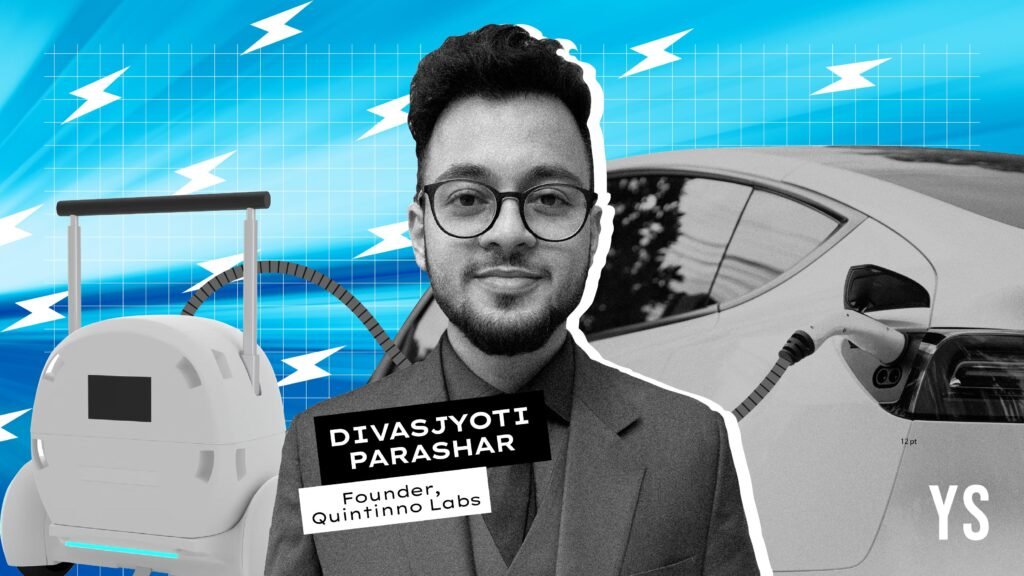
India’s energy transition is gathering steam, but two persistent problems threaten to stall its progress: a patchy EV charging network and widespread reliance on diesel generators for backup power. For electric vehicle owners, “range anxiety” remains a daily concern—especially outside metro cities. And for off-grid or crisis-prone regions, diesel generator sets (gensets) are still the default, despite being loud, polluting, and expensive to run.
That’s the twin challenge that Guwahati-based Quintinno Labs is tackling—by building a portable, solar-compatible battery-based power station that could fit in the trunk of your car.
Founded in 2023 by physicist and grassroots innovator Divasjyoti Parashar, the startup’s flagship product, QUINT, is a compact energy unit that works as an EV power bank and a clean replacement for diesel gensets.
A personal quest for power
The story began with a simple question: What if you could carry your EV charger with you—just like a power bank for your phone? That idea evolved into QUINT, a lightweight power station that gives EVs a 35–40 km boost, enough to get to the nearest charger or reach home safely. It was a response to a common fear EV drivers in India face—getting stranded without a plug in sight.
But the team soon realised that the real scope of QUINT was much broader. With its modular battery design, patented power electronics architecture, and solar compatibility, QUINT could become a go-to solution for energy backup across sectors—construction sites, disaster relief camps, rural healthcare centers, remote military outposts, and beyond.
What set QUINT apart was its versatility. In India, where power cuts are frequent and diesel gensets are still ubiquitous, a solar-capable, noise-free, portable battery system could change the energy game.
“It’s especially promising for rural India, where grid access is patchy and reliable power could mean the difference between running a business or closing shop. It’s also about climate resilience. In disaster-hit areas or flood-prone zones, where power supply collapses, QUINT can be a lifeline—quietly delivering power without the fumes or fuel logistics,” explains the founder.
Built in Guwahati
Unlike most high-tech energy startups clustered in metro cities, Quintinno Labs is rooted in Guwahati. The lab’s innovation is powered by a 7-member team working in close collaboration with Dr. Alex Huang, a renowned power electronics expert and Chair Professor at the University of Texas, Austin.
“Together, we have created indigenous technology that is not only cost-efficient but also globally competitive,” says Parashar.
This commitment to building from the ground up—sourcing components, crafting proprietary systems, and iterating designs locally—has earned them accolades and support.
They’ve raised Rs 65 lakh in equity-free grants from prestigious organisations like Emergent Ventures, Cummins CSR, and the Government of India, and recently won the Startup Maharathi Challenge at Startup Mahakumbh.
Building a deeptech hardware startup in a Tier II city like Guwahati comes with its fair share of friction—from sourcing specialised components to finding niche engineering talent, says Parashar. But Divas and his team have turned these challenges into a strength.
“We’ve fostered a strong local ethos, attracting young talent from the Northeast and beyond who want to return home and work on meaningful innovation. Their work is proof that frontier technology doesn’t need a Bengaluru zip code to thrive—it needs purpose, persistence, and vision,” he adds.
Market opportunities
The portable power station market is estimated to be valued at $1.52 billion in 2025 and is expected to reach $4.76 billion by 2032.
Currently at the prototyping stage, Quintinno Labs is gearing up for its first commercial pilot in the next 2-3 months.
While at a pre-revenue stage, the startup has already signed Letters of Intent and is in conversation with companies and organisations across sectors.
“We have been granted a design patent in India and have also applied for an international patent (PCT) for our proprietary power electronics technology,” says Parashar.
“We have received a very overwhelmingly positive response from the Assam Government’s disaster management department and the Indian Army. With the planned launch in the next 2 months, we have already secured pilot demonstrations with them,” he adds.
Edited by Jyoti Narayan

